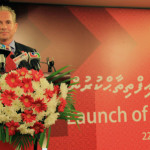The arrest and prosecution of former President Mohamed Nasheed on charges of terrorism highlights “a selective approach to justice in the Maldives,” Amnesty International has said.
The international human rights organisation noted in a press statement yesterday (March 3) that the court did not order an investigation of Nasheed’s alleged mistreatment by police on February 23.
“The court also denied him the right to be represented by his lawyer at the hearing, and rejected his request to receive medical treatment for injuries caused after police manhandled him outside the court premises,” reads the statement.
Following his arrest on February 22 ahead of a surprise terrorism trial, Nasheed appeared in court the next day using his tie as a makeshift sling after police manhandled and dragged the opposition leader into the court building.
Citing new regulations, the Criminal Court meanwhile informed the legal team on the day of the first hearing that the lawyers had to register at the court two days in advance despite being unaware of the trial until the former president’s arrest the previous day.
However, the government has maintained that due process was followed in Nasheed’s arrest and dismissed the incident outside the court building as “a stunt” pulled by the opposition leader in order to garner sympathy and support from the international community.
The government also insists that it has no role in the criminal proceedings as charges were raised by an independent Prosecutor General and tried through an independent judiciary.
Amnesty International meanwhile noted that Prosecutor General Muthaz Muhsin pressed charges against Nasheed under anti-terrorism laws after withdrawing previous charges filed under Article 81 of the penal code for illegally detaining a government employee who had not been convicted of a crime.
While the latter offence carries a jail term of up to three years, the charges of terrorism under “enforced disappearance” carries a jail sentence of between 10 to 15 years.
“A conviction would stop Mohamed Nasheed, a popular opposition leader, from contesting future presidential elections, with the next one due in 2018,” Amnesty observed.
Nasheed’s arrest warrant stated that he might not attend trial or go into hiding, Amnesty noted, and the Criminal Court at the first hearing ordered police to hold the former president in custody until the conclusion of the trial.
“Claims of his ill-treatment were substantiated by video footage, viewed by Amnesty International, which appear to show him being manhandled,” the statement continued.
“This was reminiscent of the events of February 2012 when Nasheed and his supporters were attacked by security forces. Eyewitnesses say he was dragged into the court in a degrading manner. He told the judge that he was in need of medical attention, but the judge refused his request.”
Echoing calls by the Commonwealth, UN, EU, and the UK, Amnesty urged the government to “ensure the due process of law, and that any judicial processes against Mohamed Nasheed conform to international fair trial standards.”
Amnesty also called for an independent and impartial investigation into Nasheed’s mistreatment in police custody as well as the judge’s refusal to allow the former president to seek medical treatment.
“Dozens of Nasheed’s supporters, including senior members and MPs of the Maldivian Democratic Party (MDP) were attacked and subjected to brutal beatings at the time of the disputed ousting of Mohamed Nasheed from the presidency in February 2012,” Amnesty said, referring to a brutal crackdown on opposition supporters on February 8.
“Despite concerns expressed by Amnesty International, a National Commission of Inquiry investigating the circumstances of Nasheed’s ousting, and the Maldives Human Rights Commission, no one has yet been brought to justice for those attacks. Nasheed’s arrest stands in contrast to government inaction in these cases and undermines its stated claim that his arrest is to uphold the rule of law.”
Related to this story
EU, UN join international chorus of concern over Nasheed arrest, terrorism trial
Foreign Minister Dunya slams Canada, Commonwealth statements on Nasheed prosecution
Former President Nasheed arrives in court with arm in makeshift sling
Five police brutality cases from February 2012 ongoing at court, AG tells Majlis





Amnesty International is very much hated in the Maldives.
Do we know why?
The judges residing over President Nasheed's case received Apartment keys and its registries offered to them by the Government, on 26th February 2015.
@Michael
I've got some surveillance on government bigwigs personally requesting assassinations on identified Amnesty observers.
So yeah, the enemy really hates 'em.
vanity fair nasheed!!!